A critical component of every coworking space is a membership agreement to document the rights and limitations of both coworking space owners and members. However, as a legal document, coworking membership agreements are only as effective as the details they contain.
In this article, let’s dive into the essential parts of a coworking membership agreement and the critical points coworking space owners need to consider when making one:
What are the important terms in a coworking membership agreement?
Coworking space membership agreements are critical in ensuring that coworking space owners and members are fully aware of and agree to the usage conditions, pricing, and payments, as well as the rights and responsibilities of both parties. Crafting a bulletproof membership agreement, to be effective, should outline the following most essential sections and clauses:
1. Lease terms
A coworking space provides more than just a conventional office space lease, which typically requires business owners and individuals to have long-term leases. It offers flexible, short-term leases, as short as a few days or weeks, as long as months or years. A coworking space also provides different kinds of coworking space leases that would be ideal for various types of members, depending on their use and needs:
- Hot desks: Any available space or desk within a coworking space on a first-come, first-served basis.
- Dedicated desks: Dedicated desks within a coworking space reserved solely for members.
- Private office coworking: Access a fully-furnished workspace with meeting rooms, lounge, and pantry.
A coworking space agreement should outline the lease term and the type of membership a member wants to avail themselves of. This portion should also indicate the designated area a member could access (for hot desks), the specific desk dedicated to them (for dedicated desks), or the specific floor and office area assigned to them, together with amenities they are allowed to access privately (for private office lease), and the communal areas that all coworking space members share.
This coworking space agreement by Mox.E includes tickboxes on a member’s desired lease terms and package:
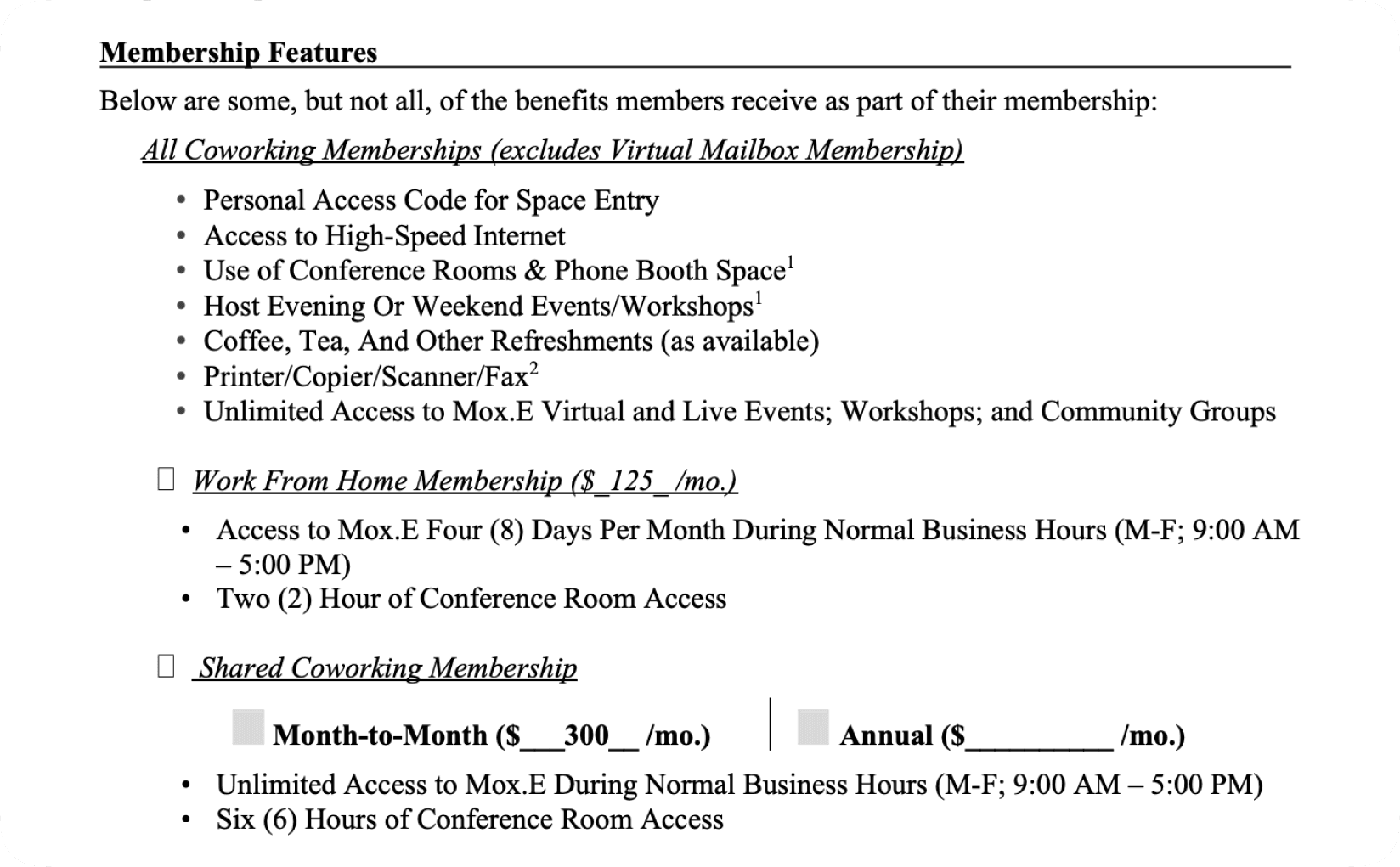
Image source: Mox.E
Grant Aldrich, Founder of Preppy, says, “Different individuals and business sizes may require different needs for coworking spaces. For example, a person studying for a professional certification may only need hot desks, remote workers may require the privacy and stability of a dedicated desk, and small to medium-sized business organizations may need to have their private area in a coworking space.” He adds, “For a coworking business to thrive, it is vital for them to be able to cater to all types of private space needs, with flexible lease terms clearly outlined in a membership agreement.”
2. Payment terms and method
It is critical for coworking space agreements to clearly indicate a member’s payment terms, packages, and method when creating a bulletproof membership agreement. For example, if your coworking space offers hot desks, dedicated desks, and private office leases, you should either have:
- Tailored membership agreements for each specific type of membership; or
- A general membership agreement where your members could tick a box for their chosen membership.
These should also contain the price and rates for each membership plan, whether members must pay per day, week, or month, and whether payments should be made in cash, card, or digital payment methods. This free coworking space membership agreement template by New Work Cities is a prime example of an agreement that includes clear price and payment terms, including any advance payment made and membership commencement.
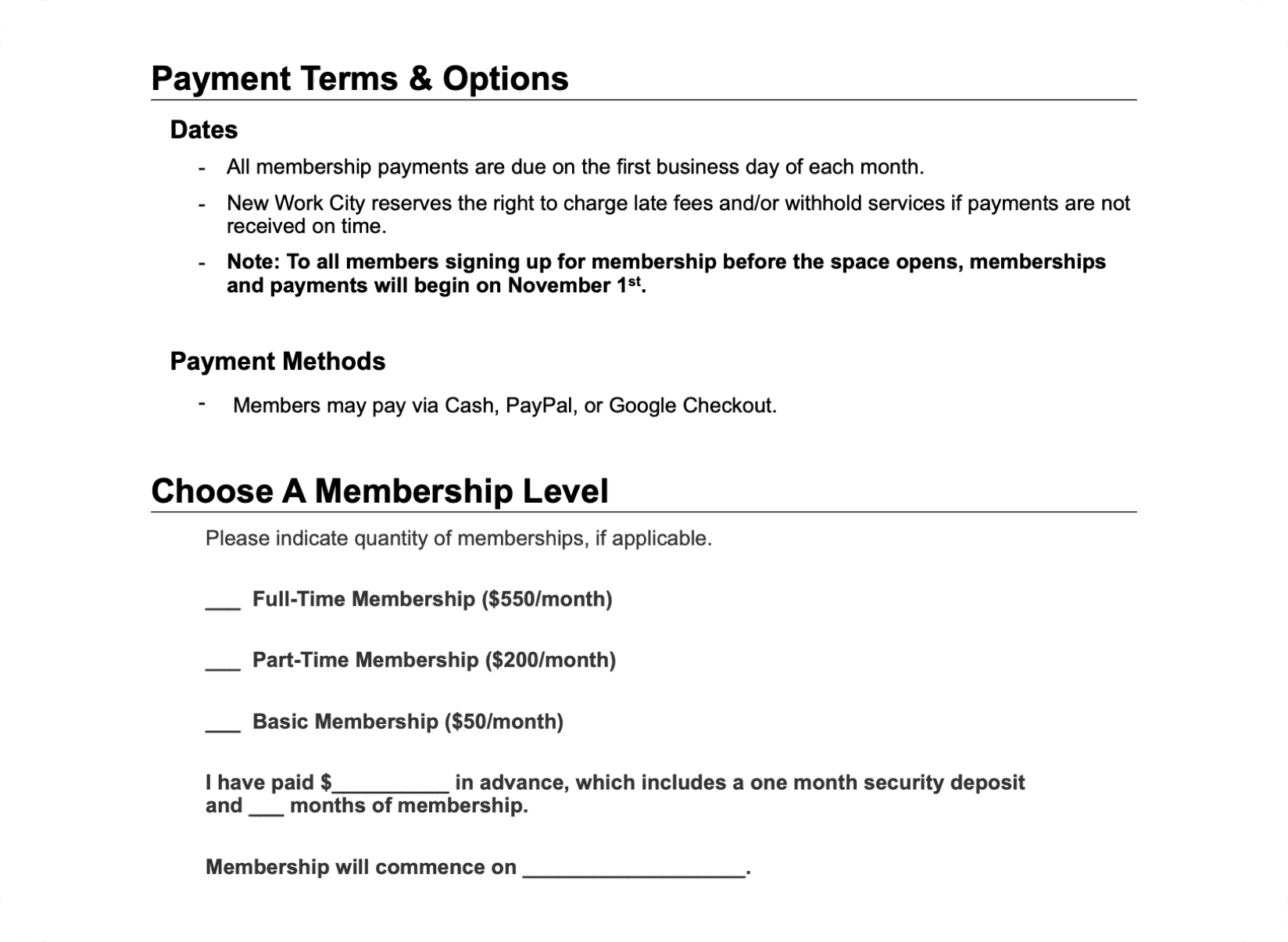
Image source: nwc.co
If your coworking space demands automating payments of membership dues as a pricing strategy, these terms should be clearly outlined in the membership agreement, as well as the specific day of the month on which the automatic charging will be made.
Adam Young, CEO and Founder at Event Tickets Center, says, “Ensuring a clear and defined checkout and payment process is critical in ensuring that there is mutual understanding between a business and its customers.” He adds, “Unclear terms, especially payment process and methods, can potentially lead to disputes and erode customer loyalty and brand image.”
Generate recurring revenue and offer exceptional customer experience at your shared or coworking space
3. House rules
As coworking spaces are communal working spaces for individuals and organizations of all kinds, it is a coworking space owner’s responsibility to ensure that this space is kept clean, safe, and organized at all times.
By outlining clear and defined house rules in your coworking space agreement, you help establish a peaceful community among your members, which fosters a collaborative and effective working environment with minimal disruptions.
This sample by Mascots is an example of one that includes the best practices necessary for all coworking space agreements.
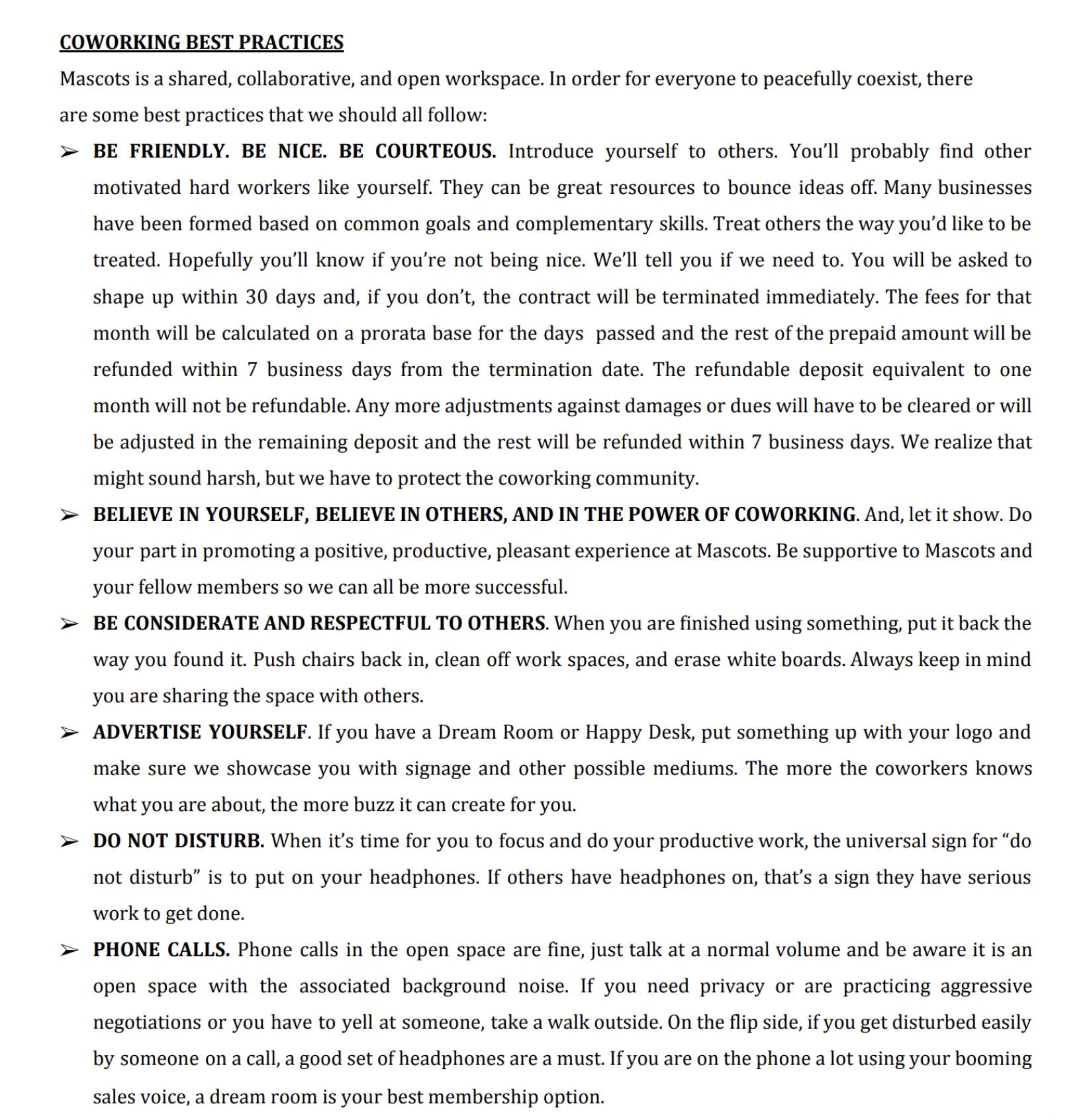
Image source: Mascots
Some of the most important house rules that should be included in your coworking membership agreement include:
- Managing noise levels in a communal space
- Keeping communal space and resources clean and orderly
- Responsibility for personal property
- Consumption of food, drinks, or alcohol within the coworking space
- Respect for established work hours and guidelines
If your coworking space also offers event centers or spaces for team-building activities or corporate events, your house rules should also indicate the general conduct, space usage, pre-event checklist, and requirements to keep mutual respect for other coworking space users during the event.
4. Confidentiality clauses
Access to a coworking space means that members could be exposing their confidential information within the vicinity of the coworking space and may also be exposed to others’ confidential business data. Because of this, coworking space owners must include confidentiality clauses in their membership agreements and emphasize that participation in a coworking space agreement obligates members to keep confidential information private from any third party.
Item 6 of this sample includes a confidentiality clause in a coworking space agreement of New Work Cities:
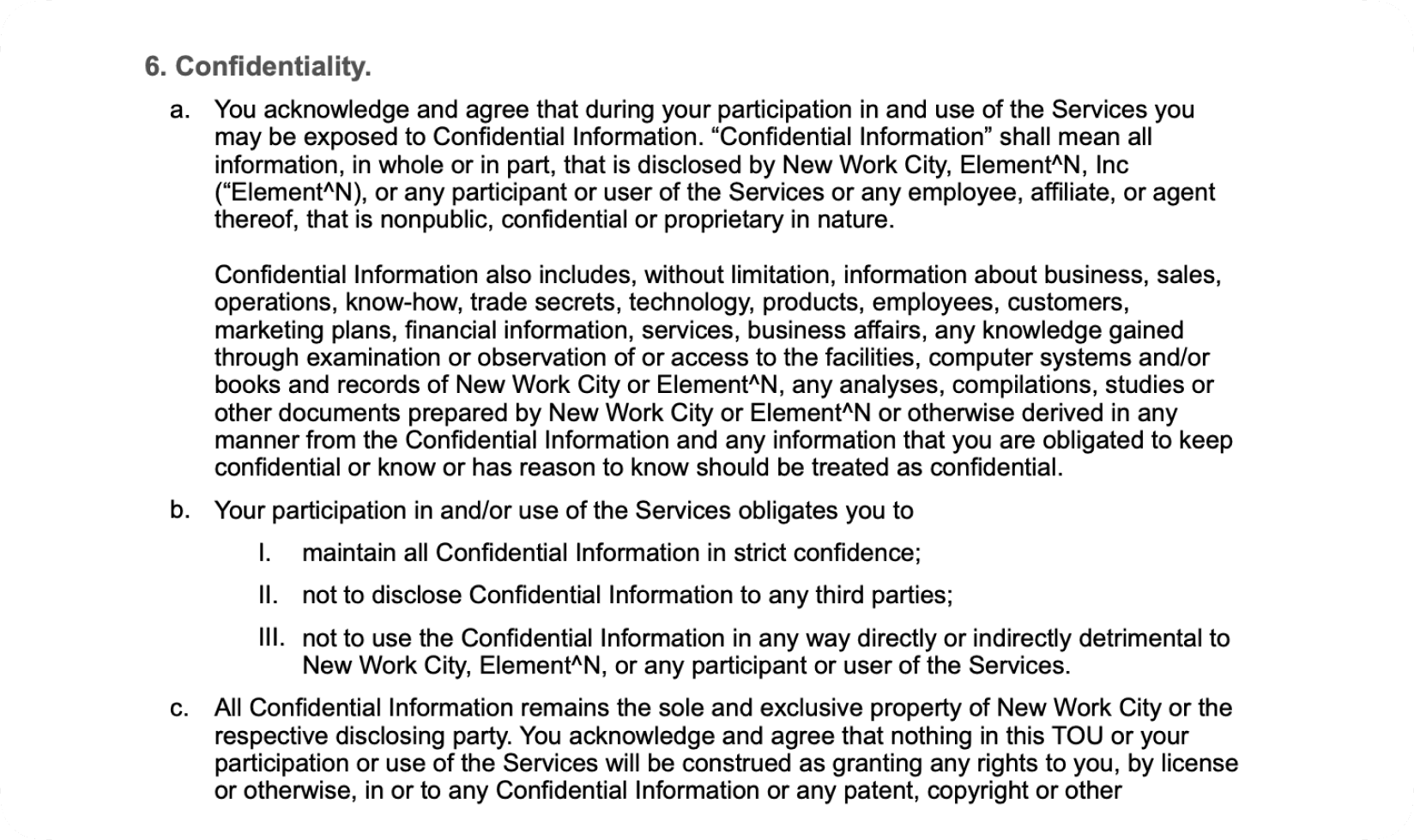
Image source: nwc.co
Sean Shapiro, Managing Partner at Axia Advisors, says, “Confidentiality clauses are critical in all business agreements, like coworking spaces and business sales, to ensure the sensitive financial information, trade secrets, customer lists, and business strategies remain confidential and exclusive to the transacting parties. These clauses also ensure that legal remedies can be taken against parties that violate these confidentiality clauses.”
5. Termination and renewal clauses
Your coworking space membership agreement should clearly indicate the grounds for terminating a member’s access to a coworking space, whether initiated by the owner or the member.
For example, your membership agreement’s termination clause could include:
- Terminating access when a member’s automatic payment method fails;
- Terminating access for material breach of house rules or confidentiality clauses;
- Terminating access for failure to comply with any provisions in the agreement after the owner has extended enough communication.
Termination and renewal clauses also help prepare coworking space owners from the sudden loss of revenue. Here is a prime example of a termination agreement clause by WeWork, where the terms for termination by the coworking space and the member are clearly outlined in the agreement:
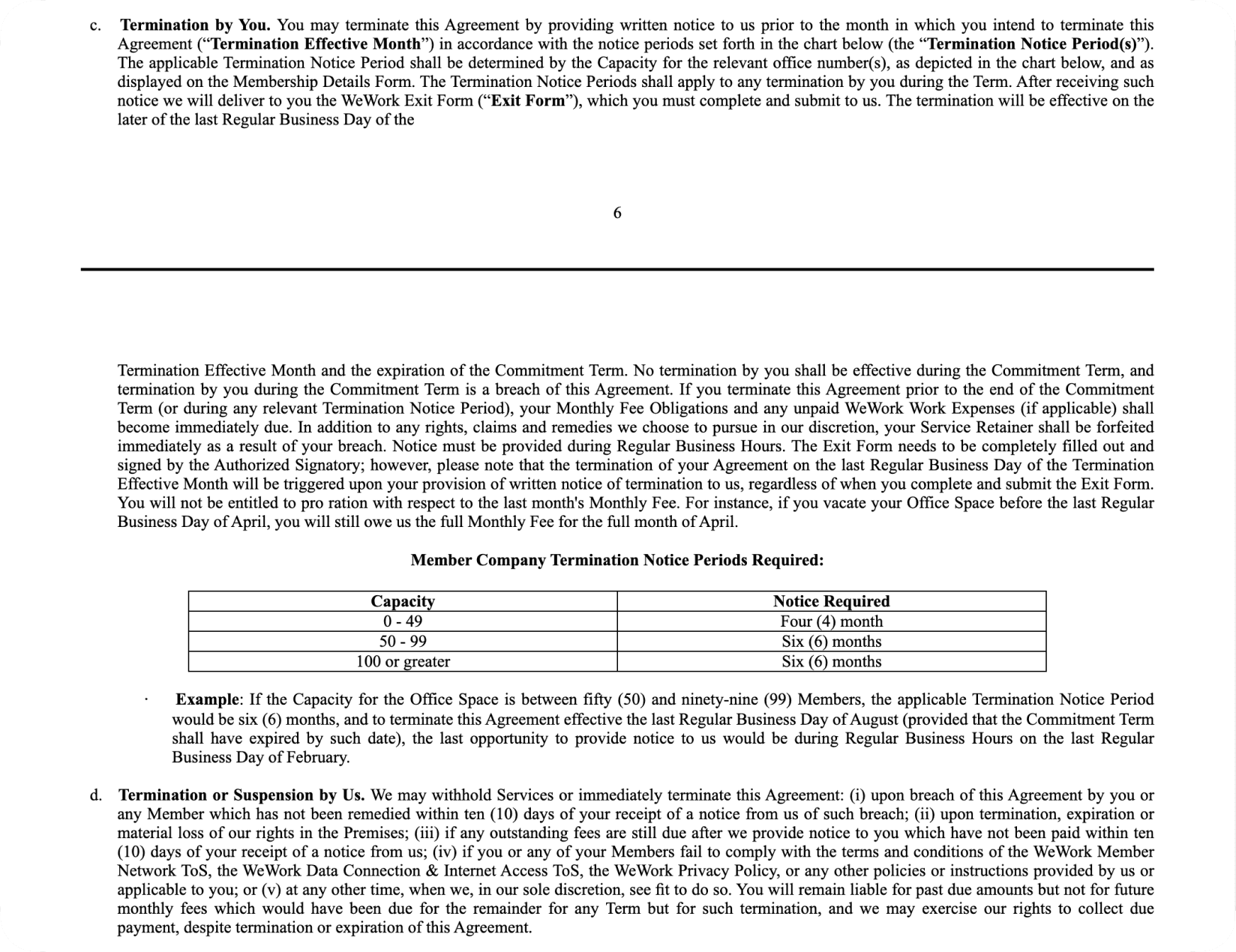
Image source: WeWork
6. Access and use of facilities and equipment
Access to coworking space shared equipment like computers, WiFi, printers, and copiers is part of the basic offerings of a small to medium-sized coworking space. In contrast, bigger coworking spaces provide access to lounges, communal spaces, rest areas, and dining areas.
No matter the business size, a coworking space agreement must include the guidelines and terms of use of commonly shared equipment and space to prevent damage and address potential safety concerns in using these facilities and equipment. In case of significant damage to a facility or equipment, the membership agreement should also outline the instances in which a member should be held responsible for the resulting damages.
This coworking space agreement by Bronx Coworking Space includes a clear indication of perks and facility access for each type of membership:
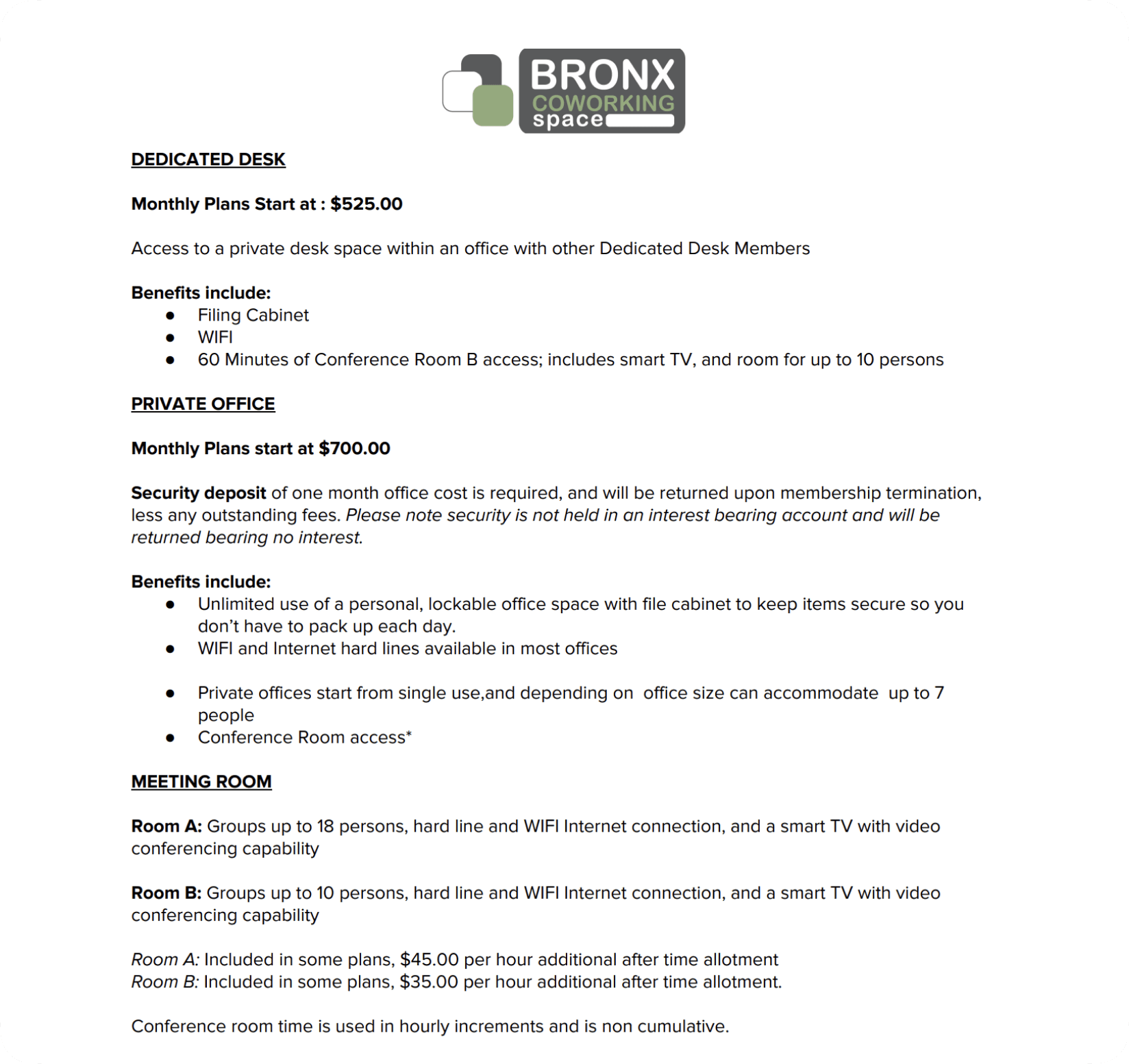
Image source: bronxcoworkingspace.com
According to Nicolas Breedlove, CEO at PlaygroundEquipment.com, “Recent trends in coworking spaces include the emergence of niche childcare coworking spaces where parents can bring their children and leave them in child-friendly areas, like play areas, study rooms, or activity rooms, while they work.” He adds, “Niche coworking spacesshould add specific clauses on access to these areas, and the particular roles and responsibilities members and owners share for these niche areas."
7. Limitations of liability and insurance
In the event of unforeseen personal damages or damages to property and facility due to negligence or accidents, both the coworking space owner and members must have a mutual understanding of the extent of insurance coverage (if any), indemnification of members by the coworking space owners for damages, and a clear process for resolution should any misunderstanding and dispute arise in the course of business.
A prime example is this coworking space agreement by 1120 CoWork, in which items 17 and 18 outline the exclusion of incidental, consequential, and other damages and personal property insurance.
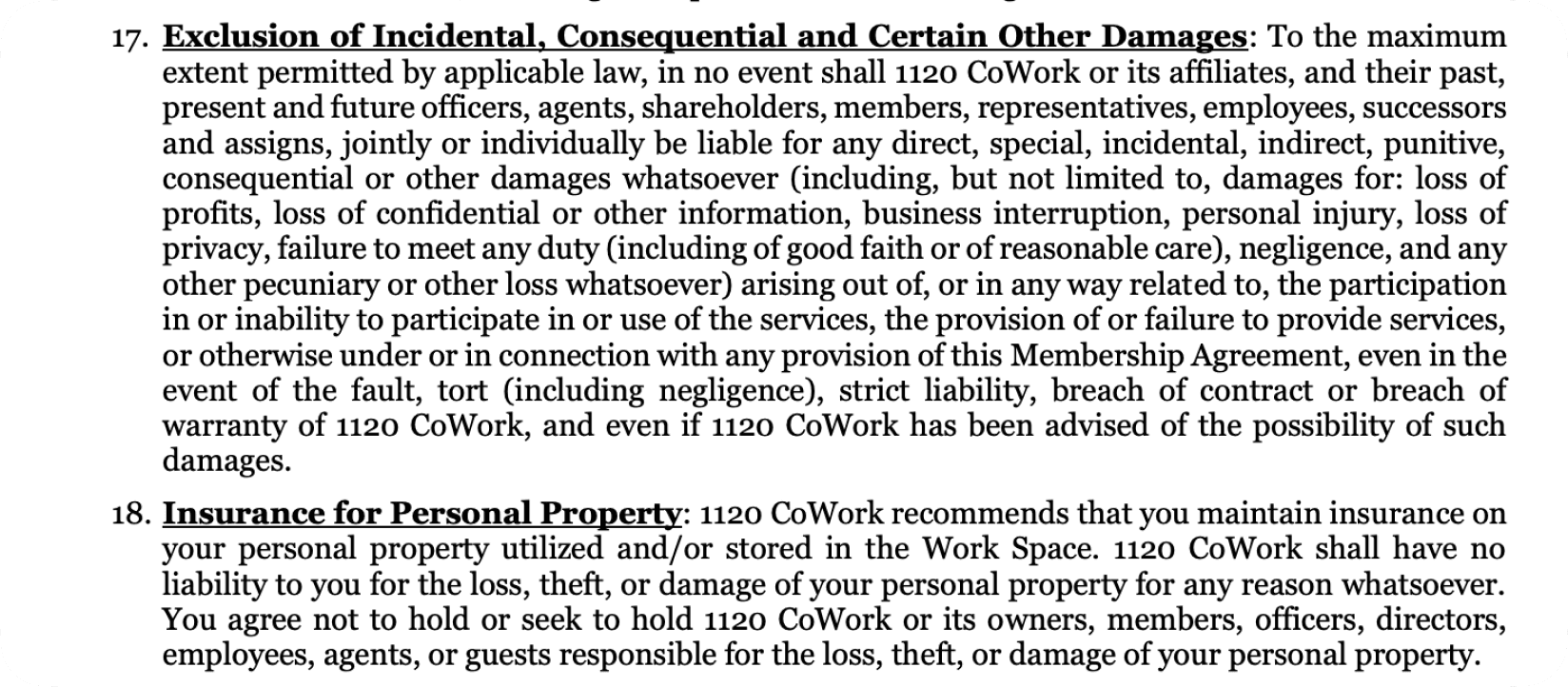
Image source: 1120 CoWork
Including these provisions in a coworking space agreement also ensures that the business has limited liability in cases where personal belongings or equipment theft occurs, which is very common in most coworking spaces.
Adrian Iorga, Founder & President at 617 Boston Movers, says, “Liability and insurance clauses are crucial in all agreements and contracts, especially when they involve potential damages to property, like in moving companies.” He adds, “For example, if a business decides to move to a coworking space, the agreement should specify a clause for the liability for damages to the coworking space caused by the move of personal equipment.”
8. Acknowledgment and signature
This is a no-brainer, but a membership agreement is only bulletproof when duly signed and dated by the member, with relevant contact details included.
An acknowledgment statement before the signature also helps ensure that a member agrees, has read and understood the agreement's content, and agrees to be “bound” to the terms of the contract upon signature and use of the coworking space services.
Here’s an example of how you can present an acknowledgment statement at the end of your coworking membership agreement:
“I/We (name of individual or organization) hereby acknowledge, understand, and agree to the above terms of this agreement, and agree to be bound to the terms of this Agreement from its commencement until its subsequent termination.”
In this sample by Mascots, the last item of the coworking space agreement indicates the full acceptance of the agreement and signature lines for both the coworking space owner and the member.
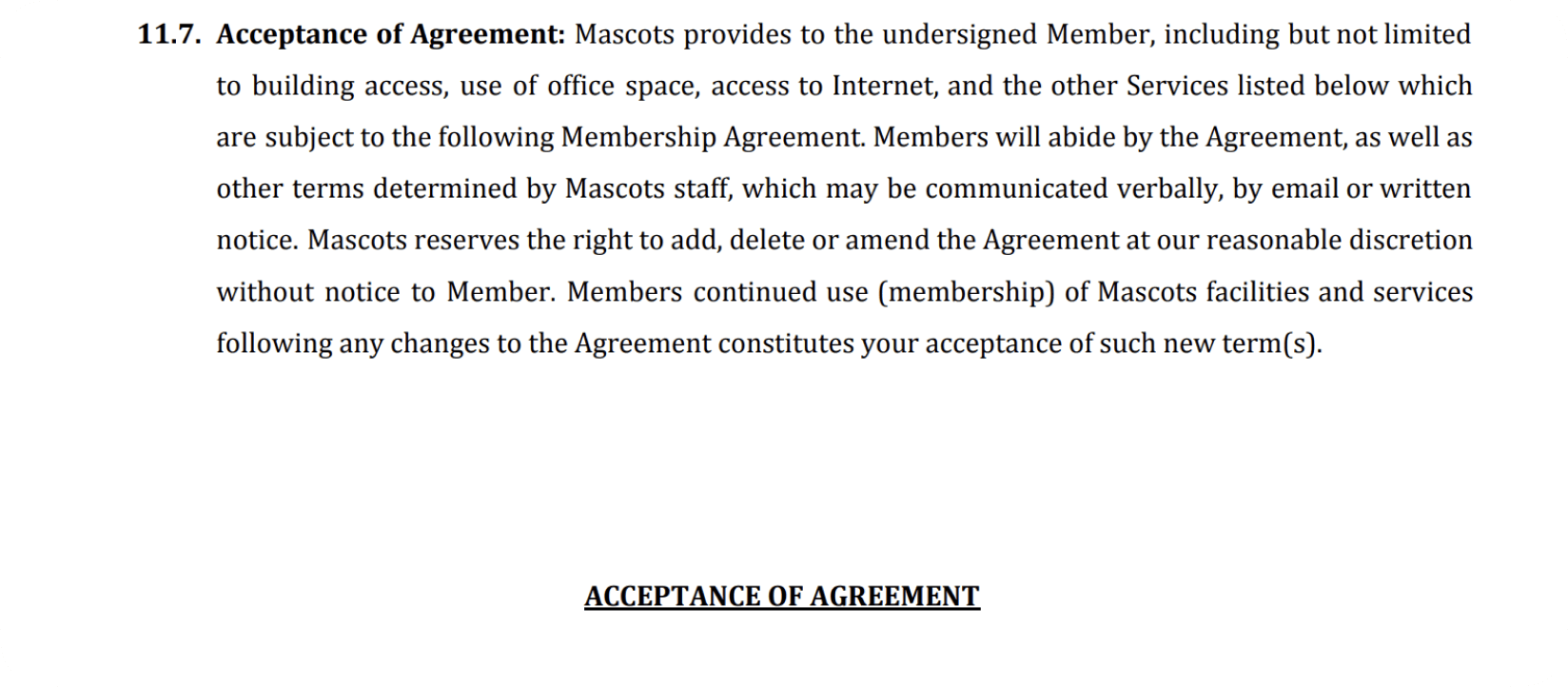
Image source: Mascots
Conclusion
Coworking agreements are essential components determining how a coworking space business operates and makes a profit. With a well-thought-out coworking space agreement, owners reduce the risk of business loss and disputes, ensuring that both the owners and their members have legal clarity and defined expectations in the service provided by the owner and the service received by the members.






